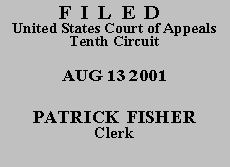

| JAMES L. BROOKS,
Plaintiff-Appellant, v. DEBORAH GRABER, Program Manager II, NRC/Code Enforcement, Unified Government of Wyandotte County/Kansas City, Kansas; LOWELL (NMI) NUNLEY, Inspector/Code Enforcement, Unified Government of Wyandotte County/Kansas City, Kansas; UNIFIED GOVERNMENT OF WYANDOTTE COUNTY/KANSAS CITY, KANSAS; CAROL MARINOVICH, Mayor, Unified Government of Wyandotte County/Kansas City, Kansas; SANDY GONZALEZ, Inspector/Code Enforcement, Unified Government of Wyandotte County/Kansas City, Kansas; KATHRYN H. VRATIL, United States Federal District Judge, Kansas City, Kansas, Federal Courthouse; UNITED STATES DEPARTMENT OF JUSTICE, Defendants-Appellees. |
|
The Kansas district court dismissed James L. Brooks' pro se suit for damages for an alleged unconstitutional conspiracy against various Kansas City defendants, the federal judge who ruled against Mr. Brooks in his previous federal suit against those city defendants, see Brooks v. Sauceda, No. 00-3025, 2000 WL 1730892 (10th Cir. Nov. 22, 2000) (unpublished), and the Department of Justice. See Brooks v. Graber, No. 00-2262-DES, 2000 WL 1679420 (D. Kan. Nov. 6, 2000). Mr. Brooks' docketing statement in this court set forth as grounds for reversal generally that "[n]o merits of the case were litigated, no substance of justice done." Instead of specifically framing the issues and supporting his claims of error with citation to pertinent legal authority as required by our federal rules of appellate procedure, Mr. Brooks has filed over 100 pages principally complaining about perceived injustices in unrelated cases from Iowa and the Eighth Circuit and insisting that his interpretation of federal rules of civil procedure is correct. He boasts that his "briefs" were "designed to prevent federal judges from out-thinking" him. Appellant's Reply Br. at 6.
After reading his "briefs," we perceive one recognizable claim of error that we have already rejected in Mr. Brooks' prior appeal, see Brooks, 2000 WL 1730892 at *2: that the district court erred in denying his demand for automatic entry of default against all defendants for having filed motions to dismiss instead of answering his complaint. Mr. Brooks "giggle[s]," Appellant's Reply Br. at 10, at the suggestion that this states one of his issues, but it seems to be a fair statement judging from his request for relief that we "sacrifice []our corruption" and "declare default by all of the defendants." Id. at 42-43.
Judges in three courts, including this one, have patiently attempted to explain to Mr. Brooks his misinterpretation of the federal rules of civil procedure, but he continues to assert with great confidence that federal judges are boneheads while he is a legal scholar. We will spend no more judicial time or resources addressing his frivolous claims. For substantially the same reasons stated in the district court's November 6, 2000 order, we conclude that Mr. Brooks' demand for automatic entry of default judgment and his motion for sanctions were properly denied and that the city and federal defendants' motions to dismiss were properly granted.
Appellees suggest that Mr. Brooks should be sanctioned for filing a frivolous appeal and for his contumacious behavior and use of threatening language in his briefs. In his opening brief, after a diatribe demonstrating Mr. Brooks' complete lack of understanding of the doctrines of sovereign immunity and res judicata, Mr. Brooks ended his remonstrations by stating that he has sovereign immunity because it is his for the claiming, and that he
is looking forward to killing civil employees with impunity. He can think of a long list of souls that should be "liberated." He looks forward to traveling from one side of town to the other unabated by traffic regulations. He looks forward to permanently and legally avoiding taxes, bankruptcy, foreclosure, breaking contracts. It's great to be King.
Appellant's Br. at 55-57. Appellees took this language as a threat and reported Mr. Brooks to the United States Marshall's service for investigation. In his reply brief, Mr. Brooks complained that appellees took his statements out of context and opined that the Tenth Circuit does not object to the above-quoted language, so why should the appellees? Appellant's Reply Br. at 27. We make it clear to Mr. Brooks that we do object to using obliquely-threatening language, and we do not condone it.
The judgment of the United States District Court for the District of Kansas is AFFIRMED.
Entered for the Court
Senior Circuit Judge
*. This order and judgment is not binding precedent, except under the doctrines of law of the case, res judicata, and collateral estoppel. The court generally disfavors the citation of orders and judgments; nevertheless, an order and judgment may be cited under the terms and conditions of 10th Cir. R. 36.3.